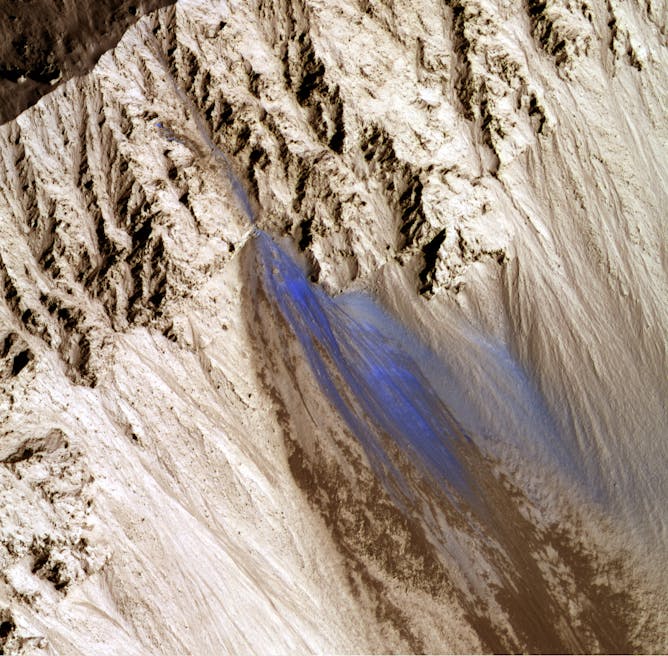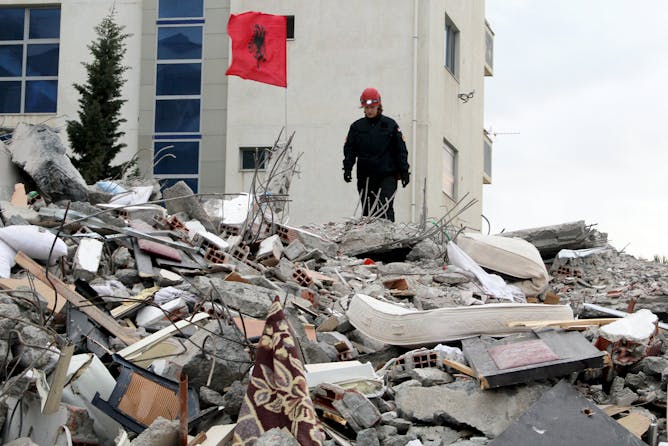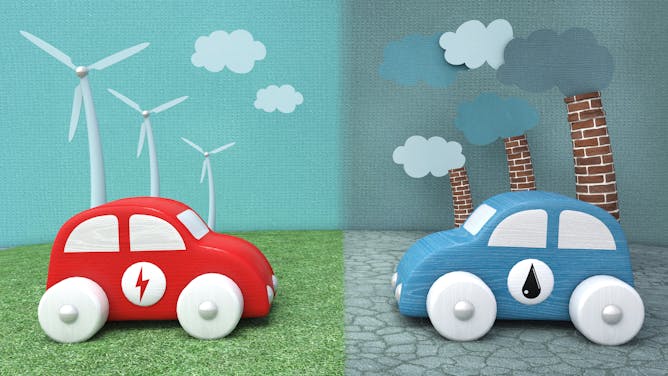|
|
|
Editor's note
|
|
Caused by huge amounts of material moving up to 360 kilometres per hour for up to tens of kilometres, some landslides on Mars seem to defy the laws of physics. The surprising lack of friction involved in these powerful events have led many scientists to think they must have formed during an ice age, with distinct long ridges thought to be the result of underlying ice at the time of the landslide.
Now new research suggests this might not have been the case at all. A team of scientists has proposed that the long ridges could have instead formed by underlying layers of unstable, light rocks, created by vibrations and collisions of rock particles at the bottom of the slide with the rough surface of the valley.
The results are important as these long “runout landslides” also occur on Earth occasionally. Here, they are hard to study as our planet is active with erosion, wind, rain, vegetation and plate tectonics, which destroys their evidence. But the new findings could help us mitigate against such devastating events, both at home and on Mars.
A recent series of earthquakes in the Balkans have left geologists concerned about the threat of more seismic events. And if you’re thinking of buying an electric car, but not sure how to answer the question of how green they actually are, read this.
|
Miriam Frankel
Science Editor
|

|
|
Top stories
|

Mars landslide. The blue area represents the landslide debris..
Giulia Magnarini, UCL; Tom Mitchell, UCL
New research on landslides on Mars could help protect against devastating landslides on Earth.
|

The aftermath of a 6.4 magnitude earthquake in Durres, Albania. November 28 2019.
EPA-EFE/MALTON DIBRA
Matthew Blackett, Coventry University
Post-earthquake aftershocks are often assumed to be less violent, but that's not always the case.
|

The car we choose and the energy system we support are linked.
Marcos_Silva/Shutterstock
Ranald Boydell, Heriot-Watt University
Our power plants may be dirty now. But unlike combustion vehicles, electric cars give us the chance to finally free ourselves from high-carbon travel.
|
Science + Technology
|
-
Christian Fuchs, University of Westminster
Public and community-owned websites and apps that value morality over profit could revitalise online culture.
-
Ben Carter, King's College London; Nicola Kalk, King's College London
'Problematic smartphone use' has similar features to a behavioural addiction – and may potentially lead to poorer mental health.
-
Toby Brown, McMaster University
Young readers ask: How did our moon get its name?
|
|
Politics + Society
|
-
Tim Ellis, Teesside University
Irish Republican, socialist, suffragette and revolutionary, Countess Constance Markievicz was a fearsome politician who was the true first female member of the British parliament.
-
Callum Tindall, University of Nottingham
Like everyone else in this election, Nigel Farage has caught the spending bug, with a little help from a 'Brexit dividend'.
-
Simon J Smith, Staffordshire University
Why the EU and NATO have struggled to cooperate fully.
|
|
Health + Medicine
|
-
Christopher Hand, Glasgow Caledonian University
"Sadfishers" are people who post sensitive or emotional personal material online to gain sympathy or attention. But this behaviour might actually indicate a deeper psychological issue.
-
Andrew Hill, University of Liverpool
NHS drug budgets could rise by billions of pounds a year after a US-UK trade deal.
|
|
Arts + Culture
|
-
Doseline Kiguru, Rhodes University
African literary prizes are slowly becoming more relevant and richer, thanks to writers organising on the continent.
|
|
Business + Economy
|
-
Ioannis Glinavos, University of Westminster
Investors in the private companies that Labour plans to nationalise are likely to seek compensation for their losses.
|
|
| |
| |
| |
| |

|
| |
| |
| |
Featured events
|

|
Julian Study Centre Lecture Theatre, University of East Anglia, Norwich, Norfolk, NR4 7TJ, United Kingdom of Great Britain and Northern Ireland — University of East Anglia
|

|
Oxford Martin School, 34 Broad Street, Oxford, Oxfordshire, OX1 3BD, United Kingdom of Great Britain and Northern Ireland — University of Oxford
|

|
Lecture Theatre One, UEA, Norwich, Norfolk, NR4 7TJ, United Kingdom of Great Britain and Northern Ireland — University of East Anglia
|

|
Portsmouth Guildhall, Portsmouth, Hampshire, PO1 2AB, United Kingdom of Great Britain and Northern Ireland — University of Portsmouth
|
|
|
|
| |
| |
| |
| |
| |
|
|
|
|
|
|
|